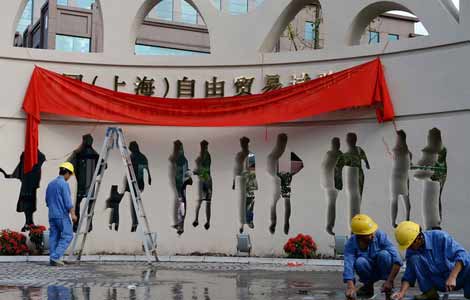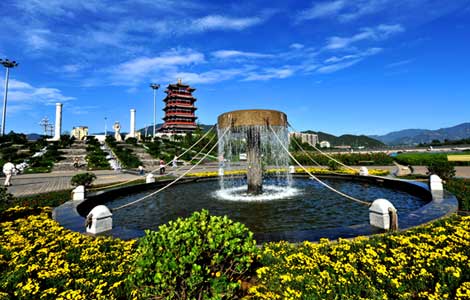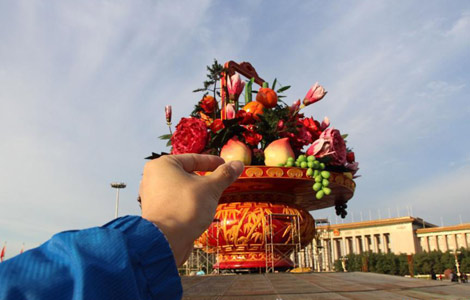Plenum history in the making
Updated: 2013-09-25 07:58
By Chung-yue Chang (China Daily)
|
||||||||
The Third Plenary Session of the 18th Communist Party of China's Central Committee will be held in November, as announced by the Political Bureau of the CPC Central Committee on Aug 27.
By definition, plenary sessions (also known as plenums) of any conference of any duration are of cardinal importance because all members of the organization who have the right to attend are required to be present at all sessions so that key operating and other important decisions could be made. For China's "reform and opening-up" to keep running smoothly, it is important that members of the 18th CPC Central Committee establish a new strategic direction at the Third Plenary Session.
The CPC Central Committee, the highest authority within the CPC, is elected every five years by the CPC National Congress. To discharge its duties the Central Committee conducts a specified number of plenary sessions during its five-year tenure. By tradition, the first two sessions are devoted to the selection of key Party and State leadership. It is at the third session that the indispensable strategy to guide the CPC and the State for the next five to 10 years is made.
Key Party officials to the 18th CPC Central Committee were elected at the First Plenary Session in November 2012. Xi Jinping was elected general secretary of CPC and chairman of the Central Military Commission. Also elected were members of the Political Bureau and the Political Bureau Standing Committee.
Key State officials were elected at the Second Plenary Session in February 2013. Xi Jinping was elected the country's president and Li Keqiang the premier. Also elected were top members of the State Council, as well as those for the bicameral legislature, the National People's Congress and the National Committee of the Chinese People's Political Consultative Conference. After the Second Plenary Session a new administration for China was born, followed by a smooth seamless transition of leadership.
In November, the Third Plenary Session will consider and decide on a new comprehensive strategic direction and programs for the next 10 years. This new direction is expected to be socio-political and, as is now increasingly the case, economic in nature, because China is moving from an export-oriented to an import-oriented economy.
People across the world are wondering what China's new strategic direction and programs will be. To know the specifics, we have to wait until November. But at this point there are telling indications that can be discerned from, for instance, the Aug 27 Political Bureau meeting.
The Aug 27 meeting tells us that the specific goal of the new policy direction will be to realize the Chinese Dream of national rejuvenation. Specifically, this dream will be realized by establishing a "moderately prosperous society" (xiaokang, an ancient ideal) before 2021 to coincide with the 100th anniversary of the CPC.
The path leading to the realization of this dream is one of "comprehensive and deepening reform and opening-up", which is a pure process that has "only a progressive tense, no perfect tense". "There is no way for China to reverse or even stop the process."
Such definitive language of the Aug 27 Political Bureau meeting indicates that China's overall strategic direction for the next 10 years will be "comprehensive and deepening reform and opening-up", to be presented with strong economic overtones. Accordingly, as the "comprehensive and deepening reform and opening up" proceeds, there will be economic ramification.
Three issues approved at the Aug 27 meeting have economic implications. First, the meeting approved plans to prevent and punish corruption. Not only is corruption morally and legally reprehensible, it is also economically damaging and corrosive. Second, it adopted plans for streamlining local government to promote greater economic efficiency. Third, it heard a report on a pilot free-trade-zone in Shanghai, which would ease foreign investment rules in order to open up the economy for greater sustainable growth.
The strategic direction to be worked out at the 2013 Third Plenary Session will be critical for China's development during the next decade, leading up to the realization of the Chinese Dream.
The 2013 Third Plenary Session has greater meaning when its strategy is contrasted with the strategic achievements of the 1978 Third Plenary Session of the 11th CPC Central Committee, as well as those of the 1993 Third Plenary Session of the 14th CPC Central Committee.
At the 1978 Third Plenary Session, China strategically ended decades of seclusion to implement reform and opening-up. At the 1993 Third Plenary Session, it strategically endorsed the socialist market economy, which led to China's rapid economic progress for the next two decades. At the 2013 Third Plenary Session, China is likely to strategically implement "comprehensive and deepening reform and opening-up" under socialism with Chinese characteristics to realize the Chinese Dream.
China began the journey in 1978 with "reform and opening-up". Now in 2013, it will finish the journey with "comprehensive and deepening reform and opening-up".
The 1978 to 2013 part of the journey was accomplished by China while working with the world with a win-win approach. The next decade-long part, leading to the realization of the Chinese Dream will also be accomplished by China working with the world with a win-win approach.
The author teaches philosophy at Montclair State University, New Jersey, US.
(China Daily 09/25/2013 page9)

 World leaders at UN General Assembly
World leaders at UN General Assembly
 China to inaugurate Shanghai FTZ on Sept 29
China to inaugurate Shanghai FTZ on Sept 29
 China's investment a 'job-saver' in Europe
China's investment a 'job-saver' in Europe
 Pollution control plan to slash PM2.5
Pollution control plan to slash PM2.5
 The beauty and beasts of selling hot houses
The beauty and beasts of selling hot houses
 Tian'anmen's flowery moments for National Day
Tian'anmen's flowery moments for National Day
 When animals meet beer
When animals meet beer
 Microsoft revamps Surface to challenge Apple
Microsoft revamps Surface to challenge Apple
Most Viewed
Editor's Picks

|

|

|

|

|

|
Today's Top News
Ultra wealthy population shrinks in China: report
White House to enroll millions in Obamacare
Brazilian president blasts US for spying
Kenya says 'defeated' mall militants
China to inaugurate Shanghai FTZ on Sept 29
Chinese, French FMs meet over Syria
93 killed as quake hits SW Pakistan
Smithfield deal 'great' for US shareholders: CEO
US Weekly

|

|




